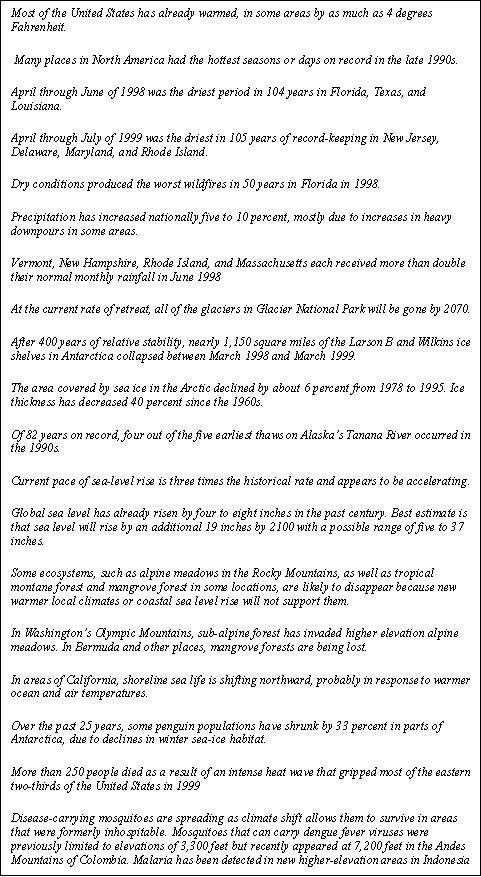
Benefit/Cost
& Junk Science
Conservative Dane
Home
Candidates &
Representatives
Current Events &
Elections
From Jeff Smith
Links
Conservative
Dane County
Representatives
Tools
Relocation Assistance
Dane
County Maps
Dane
County History
Research Topics
Government
The Kyoto Protocol required the reduction of the emissions of greenhouse gasses by 5% below their 1990 levels by the years 2008 - 2012 for every developed country in the world, with greater leniency, if not exemption, to underdeveloped and developing countries. (7% for the United States of America.)
In 2001, President Bush withdrew the United States from the treaty, citing the costs that would be incurred by the American economy.
I will go more in depth into those costs here, and in addition, question the validity of the science used to justify the treaty through a benefit and cost analysis.
Questions for class are at the end

[A good global warming source]

Manmade greenhouse gasses, caused by the burning of
fossil fuels, act as an insulator and trap heat inside the earth’s
atmosphere. This causes a
warming of the earth because the gases in the atmosphere trap the sun's
energy on earth, the gas blanket acting in the same manner as the glass
roof of a greenhouse. It allows the sun's energy to pass through it and reach the earth, but prevents some of the energy from escaping back into
space.

Data shows that in the 19th Century,
earth’s temperatures raised 1 degree Fahrenheit.
Many scientists predict (based on models) that in the next 100 years, earth’s temperature will raise 5 –
10 degrees Fahrenheit (being reported by the Natural Resources Defense
Council and many other environmental advocacy organizations).
Plus, there will be a significant rise in sea levels that will be measured in inches.
Consequences
This increase in average temperatures worldwide will
cause an increase in the number and severity of heat waves, leading to
greater evaporation and worse droughts, potentially worsening wildfires.
Increased temperatures will increase energy in the
environment and lead to worse storms with more intense rainfalls,
potentially causing worse mudslides and ground washing.
Increased temperatures will cause glaciers and
icecaps to melt, and force early thaws of ice on rivers and lakes, early thaws, and an argued
thermal expansion of the oceans due to a warming of their water, will
cause sea levels to rise. This
will lead to a loss of coastal wetlands and barrier islands that protect
coastal communities from storms and flooding.
Increasing temperatures will cause a disruption in the ecosystem, which as claimed by some scientists, will lead to a loss of some diversity in the species types on earth through their inability to adapt.
This eventuality of severe global warming will see more heat related deaths, directly through warmer temperatures themselves and degradation of air quality in various regions (effecting upwards of 80 million Americans). In addition, we would see an increase in cases of tropical disease.


Computer Climate Models predict that surface air temperatures will increase with a range from 1° - 5° Celsius, with a mean of 3.5° C. In addition, these models show that average precipitation will increase (but the rise in evaporation from warmer temperatures is predicted to overwhelm this precipitation, and soil moisture levels are thus predicted to decrease).
[A link to studies on the consequences of global warming]
[A map of where the consequences of global warming are happening]
The world's answer:

Western nations, under the Kyoto Protocol, will be required to cut greenhouse gas emissions, such as carbon dioxide, to 5.2 percent below our 1990 levels.
The United States would be required to drop our levels of CO2 output to 7 percent below 1990 levels.
The treaty must be submitted to the US Senate and ratified by 67 Senators (2/3 majority) to be made law. During the Clinton Administration, Senate Resolution 98 passed 95-0, which expressed complete bipartisan rejection of the treaty by the US Senate.
Then President Clinton, upon the results of this resolution, decided not to send the Treaty to the Senate for ratification because it would have been unanimously rejected.
Once the treaty is passed by 55 nations, and once 55% of the world's manmade greenhouse gas emissions are accounted for under the treaty, the treaty goes into effect and is ratified.
This is unlikely to happen without American Involvement.
Links:
A model of the temperature of Earth's Atmosphere since 1979.
 A link to many resources surrounding the global warming debate and the
Kyoto Protocol.
A link to many resources surrounding the global warming debate and the
Kyoto Protocol.
![]()
March 29, 2001 Salon.com article very critical of the Bush
administration's withdrawal from the Kyoto treaty.


September 11, 2001
Never Forget

God Bless America
I Pledge Allegiance
To the Flag
Of the United States of America
And to the Republic
For which it Stands
One Nation
Under God
Indivisible
With Liberty
And Justice
For All
